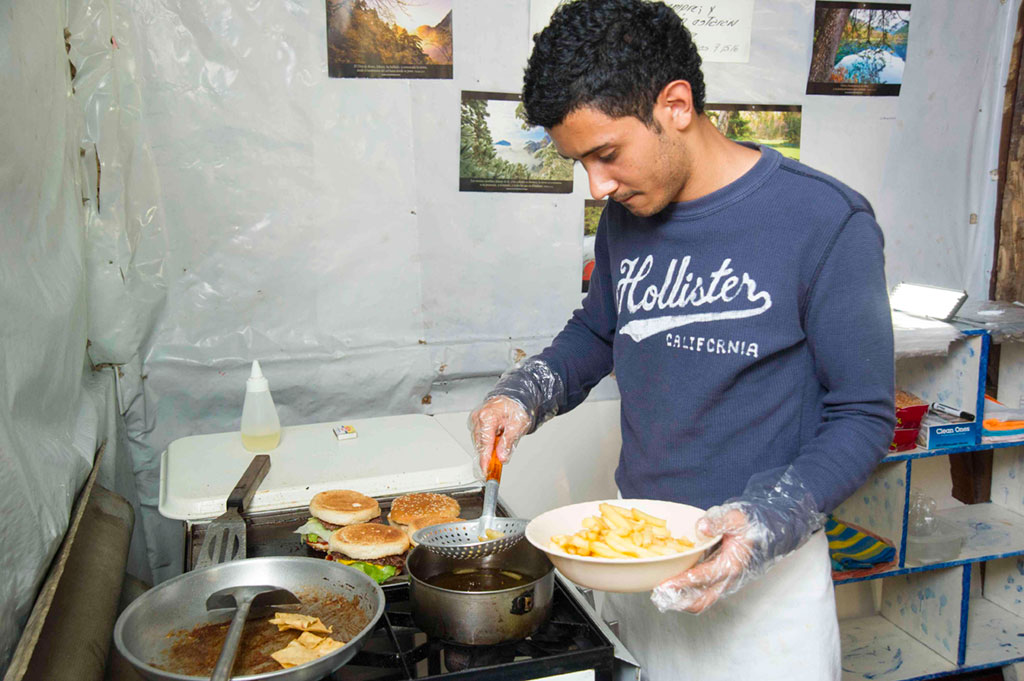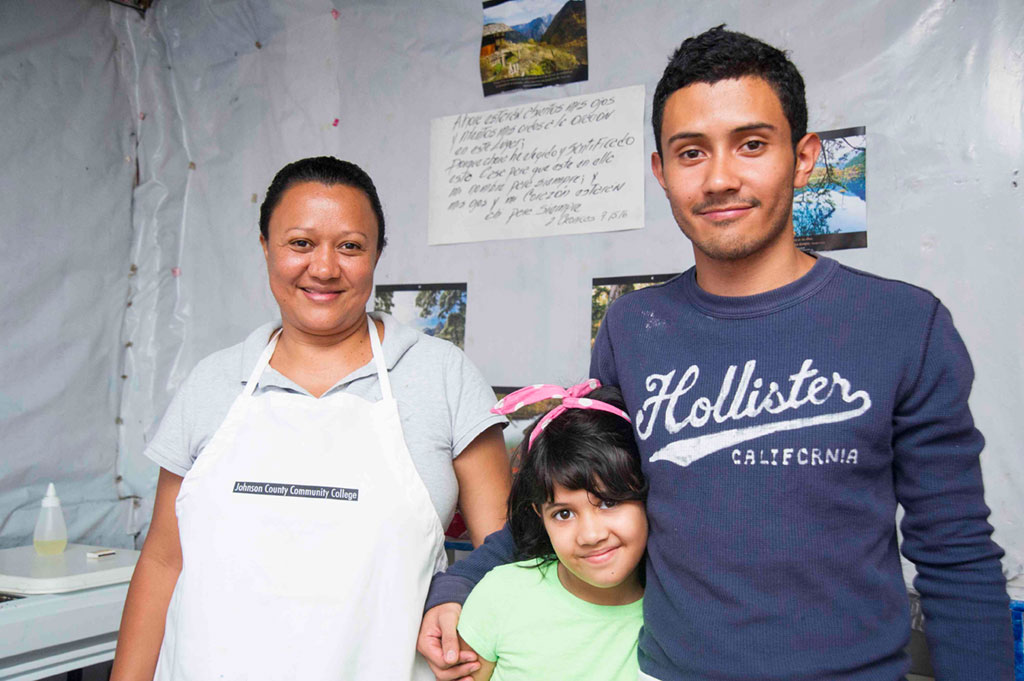Editor’s note: This story was published in December 2014. Tragically, in June 2020, Jesús “Chuy” Lanza was shot and killed in Honduras. At the time, his family continued to operate the burger business featured in this story, and Chuy was finishing up a systems engineering degree at the Universidad Nacional Autónoma de Honduras, according to reports. Creative, together with our partners in Honduras, mourns the loss of this inspiring and driven young man.
Tegucigalpa, Honduras—In his family’s small kitchen in one of the capital’s most at-risk neighborhoods, 23-year-old Jesús Lanza, wearing an apron and gloves, flips hamburger patties and fries potatoes. Today, he will sell from 16 to 25 burgers, enough to help support his parents and 8-year-old sister.
Jesús, known by his nickname “Chuy,” has a steady burger business. Neighbors regularly pop in for a bite in the tiny kitchen restaurant. He even rides in his father’s taxi for deliveries farther away.

But “Chuy’s Burgers” is about to go through a growth spurt thanks to a prize of $5,000 he won on Dec. 19 in the “Honduras Emprende” entrepreneurship contest, held annually by the Tegucigalpa Chamber of Commerce and Industry.
Chuy hasn’t always been this successful. Just a couple of years ago, he says, he was off course, involved in drugs, drinking and destructive habits. A community pastor told him this path would likely end in “either death or jail.”
“I watched my friends, one by one,” Chuy says. “The drugs were going to destroy them….I did not want this for my life and for the future of my family, so I asked God to open a door for me, a better way for my future, better welfare for my life.”
Tegucigalpa is one of the most violent cities in Honduras, considered the most dangerous country in the world outside of a war zone. Gangs and drug activity plague many of the city’s poorest barrios, like the one where Chuy and his family live.
Reintegration through entrepreneurship
With help from the Alianza Joven Honduras (Youth Alliance Honduras) violence prevention program, which is funded by the U.S. Agency for International Development and implemented by Creative Associates International, Chuy enrolled in a social reintegration through entrepreneurship and employment training program for youth at high-risk run by the Tegucigalpa Chamber of Commerce and Industry.
The program, “Second Opportunities for Our Youth,” has trained more than 150 18- to 29-year-olds in entrepreneurship, as well as conflict resolution, life planning and resilience skills. Participants learn how to start and sustain a business, and they are provided with small grants to get their ventures off the ground.
“The specific objective of the project is to reintegrate back into society people who in the past have been linked to criminal acts or have been imprisoned with a background in rehabilitation centers,” explains Fabricio Sierra, Project Coordinator for the youth-at-risk reintegration program at the Chamber of Commerce.
“What we are looking for is that these young people believe in themselves and seek alternatives to their economic problems rather than the violence, drug dealing, or belonging to criminal gangs. They have the potential to find ways to generate an income that would really be favorable—to pay their studies, pay for their houses, lights, their daily meals. We have such talented people with very entrepreneurial ideas,” he says.
For many former gang members or youth like Chuy living in violent neighborhoods, the stigma associated with their communities can prevent them from getting jobs in established businesses. Self-employment can be a viable economic alternative and a means of reintegration into society.
Collaborating on shared problems
Since 2011, Alianza Joven Honduras, USAID, the Honduran government and the Tegucigalpa Chamber of Commerce have collaborated to support former gang members and at-risk youth with job skills training and key tools for adapting to post-gang or post-crime life.
“It was definitely a challenge for the Tegucigalpa Chamber of Commerce to identify what way we can help our country to address the various shortcomings that exist,” says Karla Ruiz, General Manager of the Tegucigalpa Chamber of Commerce.
Ruiz says that when the Chamber saw the possibility to “teach what we know”—how to start a business—the program was born. Whether former gang members or at-risk youth, she says, “they definitely have the incredible potential that allows them to be linked to the labor market or even start a microenterprise.”
The Second Opportunities for Our Youth program received $30,000 in funding from Alianza Joven Honduras and another $30,000 from the government’s Security Tax Trust Committee for its 2014 and 2015 activities.
Ruiz says that by teaming up with initiatives like Alianza Joven Honduras and partners from the public and private sector, the Chamber of Commerce and other groups can work on common objectives like reducing violence and reintegrating highly at-risk youth into society.
“I think that definitely we can have an impact,” Ruiz says.
Sustainable success
The program has certainly had a positive effect on Chuy, who plans to use his “Honduras Emprende” contest award of $5,000 to expand Chuy’s Burgers, which will ultimately generate additional income for his family.
In the meantime, he continues to deliver his signature burgers to schoolkids and teachers, neighbors and even employees at the Chamber of Commerce. He jokes that his customers are from ages 7 to 80 years old.
“Jesús for us is a success story,” says Ruiz.
But he is not the only one.
Sierra, the coordinator of the at-risk youth project at the Chamber of Commerce, reports that more than 90 percent of program participants complete the full training.
Another entrepreneurship program graduate named Fernando, he says, is paying his way through a college degree in teaching thanks to profits from his small CD business, which he started with seed money provided by the Chamber.

“I believe that if we continue betting on reintegration, we will achieve having a successful country,” says Sierra.
As more former gang members and at-risk youth turned entrepreneurs launch their own enterprises and succeed, they will be positive examples to the youth in their communities and show them that there can be viable opportunities outside of violence, Sierra says.
“This project is a great support for youth today,” says Chuy, noting that many young people in neighborhoods like his don’t live to reach the age of 20 due to violence, and youth are both victims and perpetrators of this crime.
“I think that providing jobs for society gives them the opportunity to engage. [Youth] will give 100% and will fight for the longing in their hearts to become better people.”
With the support of Alianza Joven Honduras and the Chamber of Commerce, Chuy experienced that transformation.
“If you had seen me in the past, and now what I am, there has been a totally radical change,” he says. “If my friends had this opportunity, I think they would become better human beings for Honduras.”
With reporting by Emanuel Rodriguez.
